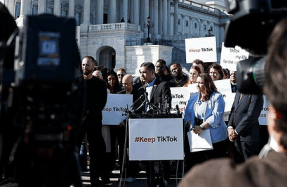
“Patriots,” Wes Moore says, pausing for effect. The room falls silent; the slot machines in the lobby are quiet. “I’m thankful that I’m in a room full of people who understand what that word means.”
About 80 military veterans sit at plastic-clothed tables in front of a bar topped with metal buckets of Coors Light. It’s a chilly January night at an American Legion hall on Maryland’s Eastern Shore. Moore is wearing a tie but no jacket, his bald head gleaming under the fluorescent lights. In a few days, the 44-year-old will be sworn in as Maryland’s first Black governor—the third elected in American history and the only one currently serving. Tonight he has come to this mostly red, mostly white swath of an otherwise very blue, very Black state to connect with his soon-to-be constituents. “Patriotism is not waving a flag around,” Moore says. “Patriotism is not telling our neighbors that we are better than them. Patriots—this is our time to get this right.”
Moore’s theme is both a product and a through line of a remarkable biography. Growing up fatherless and surrounded by violence, he turned his life around, graduated Phi Beta Kappa from Johns Hopkins University, and won a Rhodes scholarship to Oxford. He’s a decorated Army combat veteran, a best-selling author of inspirational memoirs, and a former Wall Street banker, small businessman, and nonprofit CEO. Just weeks into his first term in elected office, he is widely considered the Democrats’ most talented political newcomer since Barack Obama.
Headlines already speculate he’ll be the second Black President. The party’s leading figures clamor to associate themselves with him: President Biden held a rally with him right before the November election, and Obama himself cut an ad on Moore’s behalf. Representative Steny Hoyer, the former House majority leader, puts Moore in a category with Obama, Bill Clinton, and John F. Kennedy. “Wes lifts people up from their cynicism into their optimism and gives them a sense of the possible,” says Hoyer, who endorsed Moore and barnstormed his Maryland district for him despite planning to stay out of last year’s crowded gubernatorial primary.
For Democrats, the promise Moore represents can’t come too soon. The party’s stronger-than-expected midterms did little to quell its underlying angst: an aging cast of top leaders, a widening cultural gulf with working-class voters, and a brand yoked in the public mind to unpopular left-wing ideas. Biden’s own pollster, John Anzalone, warned Democrats in a post-midterm memo not to take too much credit for 2022’s successes, which were primarily the result of Republicans’ deficiencies. Liberal scholar Ruy Teixeira says many Democrats’ tendency to see the worst in America puts them at odds with the mainstream. “It’s very popular among large sectors of the left to talk about how fundamentally we’re a benighted country, white supremacist, bigoted and oppressive,” Teixeira says. “This just isn’t where most people are coming from. Most people are proud to be Americans.”

In the popular imagination, is a right-wing






